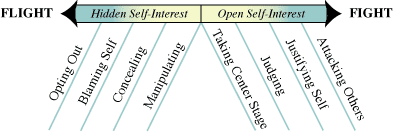The Fight/Flight Continuum
The response to extremism in society is “flight or fight” reactions. Our fear compels us to either withdraw more or fight more. Self-protection, not growth drives our choices. Self-interest, not mutual concern, motivates what we do. Consequently, people are either more guarded and closed or more hostile and aggressive:

To control the perceived
threat, we adopt a coping style from a continuum of behaviors, using increasingly
excessive measures we believe will rescue us, but instead, these measures
only polarize or divide us more. The flight response manifests itself
in our failing to speak out; we try to hide our hurt and anger. To protect
ourselves, our interpersonal behaviors are covert; we manipulate, blame
ourselves, or opt out in some way. Martyrdom and self-pity shape our responses.
On the other hand, the fight response manifests itself in our becoming
more aggressive, using power (position, verbal ability, intelligence)
to force our own agenda or self-interest. We monologue, judge, criticize,
and attack others, using our anger to control them. Self-righteousness
shapes our responses.
Both of these two extreme responses perpetuate an atmosphere in which
people do not feel safe; people need to feel reasonably safe to work together
efficiently and effectively. When we are constantly bombarded by threats
to our well-being, is it any wonder that employees feel their power slipping
away?
The
hero understands and accepts his personal
vulnerabilities and tendencies but labors to do the
hard and good things that he or she cannot yet do.
The hero at work exercises focus and determination, laying claim to divine or spiritual powers that eliminate the popular copouts of extremism. The hero develops the courage and self-discipline to face the challenges head-on in responsible ways.
Flight
Responses
Escape the unpleasant
Avoid challenges if possible
Withdraw / avoid/ hide
Passive aggressive pretending
Deny responsibility
Undiscussables
“Politically Correct” action
Smooth over conflict
Paranoid fear
Apathy / hopelessness
Bias to avoid friction
Malicious compliance
Hero
Response
The only way out is through
Challenges bring growth
Talk it through / work it out
Constructive confrontation
Accountability / commitment
Openness / candor
Fair treatment
Negotiation / compromise
Mutual trust and respect
Organizational citizenship
Diversity brings strength
Ethical champion
Fight
Response
Attack the unpleasant
Challenges are threats
Take out frustrations
/ act out
Sabotage / revenge tactics
Blaming / scapegoating
Office politics / power games
Opportunism
Force / coercion / dominance
Paranoid mistrust
Egotism / pride
Bias to play favorites
Frivolous litigation
In an ideal world, we would always respond heroically. However, since human beings are works in progress, we make mistakes. The hero understands that most of his or her extreme behaviors are human and expected to be short term; they are functional, temporary survival tactics. But when fight or flight responses become routine patterns of behavior, they become destructive to ourselves and others. The hero understands these coping methods may be used with either positive or negative intent resulting in similar consequences:
|
Tactic
|
Positive
Intent
|
Negative
Intent
|
The hero is aware that our intentions influence every thought, action, and feeling. He knows that cause and effect are connected and controlled by the choices we make.
You
create your own future.
What you see and feel is what you get.
Since we choose our intentions (based upon our assumptions and beliefs), we also choose the outcomes because we decide how we will react to an event. If our purpose or the way we find meaning in life is an attachment to a higher law, we always have liberty because we choose how we will react to adversity. Hence, we are responsible for what happens to us in the big picture of life.
Claiming this personal power by making responsible choices is an important goal of the hero’s journey. Yet, many of our misconceptions about the dynamics of abuse and adversity hold us back from embracing this power. Our victim attitudes hold us hostage to a life of helplessness and hopelessness.
Download
the Free Book:
Heroworks: Becoming Your Own Hero at Work
Terms of use, privacy policy